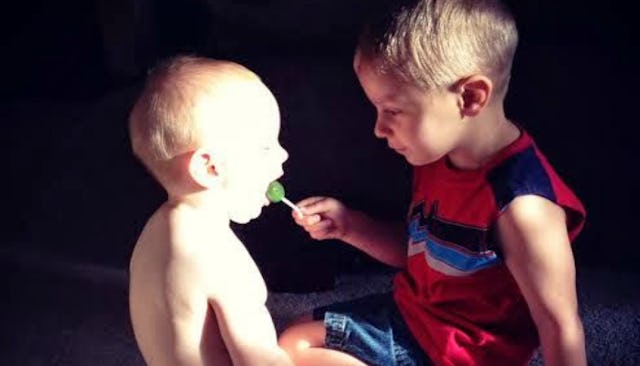The Beauty Of Brotherly Love

When I was pregnant with my second son, I worried relentlessly about my first. Would there be enough love to go around? Was I cheating him by now having to divide my time and attention? Had we made the right decision in having a second baby at all?
But when his brother was born, my oldest son — who was 3 at the time — wanted to hold him. So we placed the baby in his lap and I held my breath in nervous anticipation. He gingerly counted the tiny pink toes, then whispered, “Do you want some of my Skittles?” And since everybody knows that toddlers aren’t exactly renowned for their willingness to share, I began to relax, hoping that this was the beginning of a beautiful friendship.
Don’t get me wrong, they don’t always share so easily. Now they’re 11 and 8, and we’ve added two more brothers to the mix over the years, so squabbling is basically par for the course around here. As boys do, they tackle and wallop and pummel one another, heaving and huffing angrily. But 10 minutes later, they’re watching TV in a collective heap, so physically close — a head on a brother’s shoulder, a leg draped over someone else’s leg — that they remind me of the way twins are entwined in utero. And despite the fact that they each have their own beds, they prefer to sleep in the same close proximity, bunched onto a twin-sized mattress with elbows and feet hanging off the sides and resting mere inches from noses. Yet if one dares to encroach a single millimeter into his brother’s space in the car or at the dinner table, it’s practically an act of war. Go figure.
They give each other grief relentlessly, teasing about crushes and mispronounced words and fears and nose-picking habits. But on the occasion that someone outside the family dares to mock these things, they are swiftly reminded of the strength of brotherhood as the boys flock to one another’s defense. Apparently, they’re allowed to prey on one another’s insecurities — it’s part of their duties as siblings, after all — but no one else should ever dare. It’s one instance where the phrase “You are your brother’s keeper” can be proven true; the way they have each other’s backs is heartwarming. Even the quietest, least assertive of the bunch is quick to stand up for an injustice where his brothers are concerned.
Their adoration for each other is overwhelming and beautiful. It’s one of them saving up their allowance for weeks and then spending it on something for his brother because “he’s going to love this, Mom.” It’s one of them getting in trouble and the other crying when he sees his brother’s tears. It’s sharing a coveted snack, or gifting a prized Pokémon card, or helping with homework when there’s a struggle, or riding the bike more slowly so that little brother can keep up. It’s doing all these things even though they’ve recently proclaimed each other annoying or spat out something vile like, “I wish you were never born!”
I could write a thousand more words about the intricacies of brotherly love, and never do its depth and complexity justice. But I observed an interaction between my two oldest boys when they were small that pretty much sums it up. They were sitting on the couch one morning, and I heard my toddler say to his big brother in a voice filled with admiration, “Colin, I love you so much.” Of course, my heart melted, and I hung back to watch from the sidelines.
“I love you more, Cameron,” crooned my kindergartner sweetly. (By now I was practically in a puddle on the floor.)
“No, I love you more,” answered Cameron.
“I love you more, more, more,” Colin said. There was an edge creeping into his voice.
“Noooo,” Cameron was getting agitated. “I love you more more more more more.”
Colin’s turn: “I love you more more more more more mooooore!”
Finally, Cameron was red-faced and shrieking, “NO COLIN! I LOVE YOU MORE!” and I had to separate them because it had come to blows and they were both crying. All over who loved who more. Oh, the irony.
Brothers are, at turns, the worst enemies and the greatest allies. They’re built-in playmates, and at times, sparring partners. They are one another’s first best friend, teaching each other valuable lessons about love, loyalty, compassion, and compromise. And if you’ve ever had the privilege of witnessing the bond, you’ll know just how deep and indestructible it is.
…even when there’s violence involved.